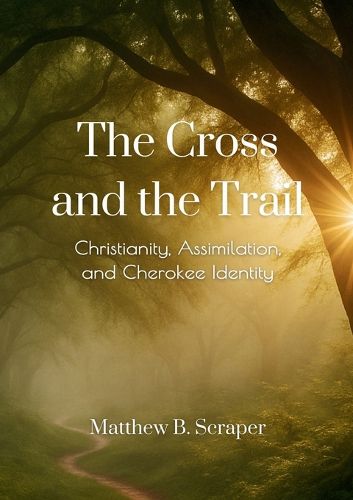Readings Newsletter
Become a Readings Member to make your shopping experience even easier.
Sign in or sign up for free!
You’re not far away from qualifying for FREE standard shipping within Australia
You’ve qualified for FREE standard shipping within Australia
The cart is loading…






This title is printed to order. This book may have been self-published. If so, we cannot guarantee the quality of the content. In the main most books will have gone through the editing process however some may not. We therefore suggest that you be aware of this before ordering this book. If in doubt check either the author or publisher’s details as we are unable to accept any returns unless they are faulty. Please contact us if you have any questions.
For centuries, Christianity was wielded as a weapon against the Cherokee people-a tool of assimilation designed to sever them from their language, their ceremonies, and their way of understanding the world. Missionaries came with Bibles in hand, but beneath their message of salvation lay a darker truth: Christianity was never meant to coexist with Cherokee identity. It was meant to replace it. In The Cross and the Trail: The Battle for Cherokee Spiritual Sovereignty, Matthew B. Scraper-a citizen of the Cherokee Nation and a former United Methodist minister of 20 years-confronts the lasting impact of this forced spiritual conversion. Drawing on history, theology, and personal experience, he unravels the ways Christianity reshaped Cherokee traditions, dismantled matrilineal governance, and imposed a framework of sin and guilt that was never ours to begin with. But this book is more than a critique-it is a call to reclaim what was stolen. Scraper challenges Cherokee people to decolonize their spirituality, to return to the sacred fire of their ancestors, and to envision a future where their faith is not dictated by the church, but by the land, the water, and the stories passed down through generations. What does it mean to be Cherokee beyond the cross? And what might spiritual sovereignty look like for a people who were told they could only find salvation in a foreign god? This is not just history-it is a battle for the survival of a sacred way of being.
$9.00 standard shipping within Australia
FREE standard shipping within Australia for orders over $100.00
Express & International shipping calculated at checkout
This title is printed to order. This book may have been self-published. If so, we cannot guarantee the quality of the content. In the main most books will have gone through the editing process however some may not. We therefore suggest that you be aware of this before ordering this book. If in doubt check either the author or publisher’s details as we are unable to accept any returns unless they are faulty. Please contact us if you have any questions.
For centuries, Christianity was wielded as a weapon against the Cherokee people-a tool of assimilation designed to sever them from their language, their ceremonies, and their way of understanding the world. Missionaries came with Bibles in hand, but beneath their message of salvation lay a darker truth: Christianity was never meant to coexist with Cherokee identity. It was meant to replace it. In The Cross and the Trail: The Battle for Cherokee Spiritual Sovereignty, Matthew B. Scraper-a citizen of the Cherokee Nation and a former United Methodist minister of 20 years-confronts the lasting impact of this forced spiritual conversion. Drawing on history, theology, and personal experience, he unravels the ways Christianity reshaped Cherokee traditions, dismantled matrilineal governance, and imposed a framework of sin and guilt that was never ours to begin with. But this book is more than a critique-it is a call to reclaim what was stolen. Scraper challenges Cherokee people to decolonize their spirituality, to return to the sacred fire of their ancestors, and to envision a future where their faith is not dictated by the church, but by the land, the water, and the stories passed down through generations. What does it mean to be Cherokee beyond the cross? And what might spiritual sovereignty look like for a people who were told they could only find salvation in a foreign god? This is not just history-it is a battle for the survival of a sacred way of being.